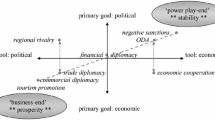Abstract
Japan will probably benefit from changes in Eastern Europe. The government has offered a $1.9 billion assistance package to Hungary and Poland, its businesses are cautiously concluding joint ventures and investments there, and it is cooperating with Europe and the United States in reconstruction efforts. The effects on Japan-U.S. relations will be small though positive, since cooperative efforts on aid and in relaxing export controls seem to out-weigh risks of confrontation. The perception of an economic threat from Japan, however, is rising as cold war tensions ease.
Similar content being viewed by others
Author information
Authors and Affiliations
Additional information
This article will appear as a chapter inAsia and the Decline of Communism, co-edited by Young C. Kim and Gaston J. Sigur (New Brunswick, NJ: Transaction Publishers) (forthcoming in 1991).
Rights and permissions
About this article
Cite this article
Nanto, D.K. Eastern Europe and Japan-U.S. economic relations. Journal of Northeast Asian Studies 9, 3–21 (1990). https://doi.org/10.1007/BF03025173
Issue Date:
DOI: https://doi.org/10.1007/BF03025173




